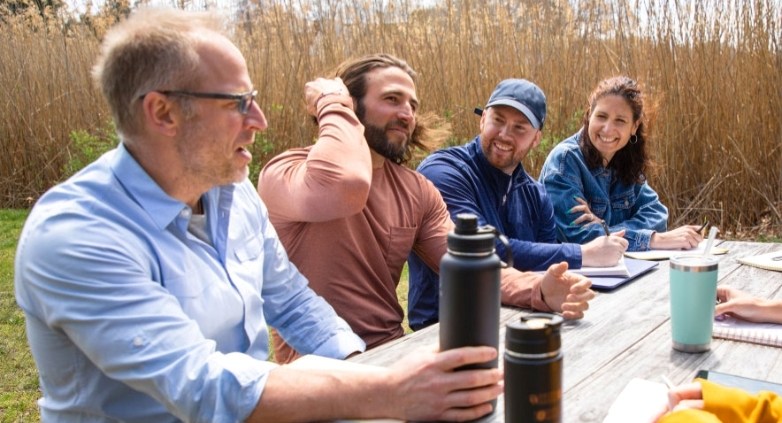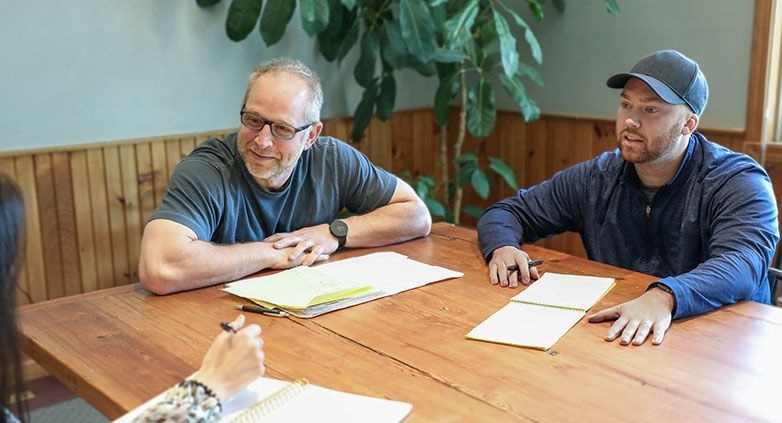
How to Help an Alcoholic Parent – A Guide for Families
When your parents struggle with alcohol, the impact ripples through the entire family, emotionally, physically, and mentally.
Helping an alcoholic parent is emotionally complex and deeply personal. You may feel torn between love, responsibility, and fear. But support is possible, for your parents and for yourself. Families play a powerful role in recovery, and your involvement can be a catalyst for change. At Project Courage, we support families through every stage of the recovery process, both virtually and in person, making it easier to find help no matter where you are.
Read on to learn how you can recognize the signs, protect your own well-being, and gently guide your parents toward recovery.

Recognizing the Signs of Alcohol Use Disorder (AUD)
Understanding how to help an alcoholic parent starts with learning to recognize the early and ongoing signs of Alcohol Use Disorder (AUD). These signs can be subtle, especially in older adults, where alcohol-related symptoms are often misattributed to aging or other health concerns.
Your parent may not appear “out of control,” but problem drinking can still be present. Key signs include:
- Drinking more or for longer than planned
- Unsuccessful attempts to cut down
- Ignoring responsibilities at work or home
- Emotional withdrawal or increased secrecy
- Sleep disturbances, mood swings, or irritability
- Health problems worsened by alcohol, such as high blood pressure or cognitive decline
- Changes in personal hygiene, appetite, or energy levels
Real people. Real support.
Seeking Help for Yourself or a Loved One?
Connect with our professionals to start the journey to recovery.
Call 860.388.9656 for immediate support.
If you’ve noticed some of these behaviors but still feel unsure, it may help to explore this guide on how to know if someone has a drinking problem, it outlines warning signs in more detail and helps distinguish between heavy drinking and AUD.
According to the National Institute on Alcohol Abuse and Alcoholism, AUD is a medical condition that affects brain function and behavior. It’s not a moral failing, it’s a chronic, treatable disorder that can worsen without proper intervention. Educating yourself on this distinction is essential if you’re hoping to guide your parents toward recovery in a healthy, effective way.
Another useful resource is our article on the steps to help someone with addiction, which covers how to take action with empathy and intention, even when you’re not sure where to begin.
Still, it’s important not to self-diagnose your parent’s drinking problem. If you’re feeling overwhelmed, Project Courage offers confidential family consultations, available both virtually and in person, to help you determine whether AUD may be present and what your family’s options are.
Recognizing the signs of alcohol addiction in a parent is never easy, but it’s the first step in building a compassionate, informed support system. With the right knowledge and help, your family doesn’t have to navigate this alone.

The Emotional Toll on Adult Children and Families
The Weight of Responsibility
When your parent struggles with alcohol, it can feel like the roles have reversed. Adult children often step into caretaker or “fixer” roles, sacrificing their own emotional needs in the process. This can lead to codependency, where your identity becomes tied to your parent’s behavior and well-being.
If you find yourself constantly managing their moods, making excuses, or trying to “keep things together,” you’re not alone. These patterns are common and deeply ingrained, especially in families with a long history of addiction.
Explore common family dynamics in addiction with our article on family roles in addiction.
Unpacking Difficult Emotions
It’s normal to feel guilt, resentment, anger, or fear, sometimes all in the same day. These emotions are valid, and ignoring them often makes things worse. You may also struggle with grief, especially if your parent’s drinking has altered your relationship or their personality.
Setting boundaries isn’t selfish, it’s necessary. If this concept feels unfamiliar, we recommend reading about how to help a drug-addicted family member, many of the same emotional principles apply to alcohol use.
You Don’t Have to Do This Alone
Many adult children of alcoholics feel isolated, but support is available. Groups like Al-Anon provide a safe space to connect with others facing similar challenges. You’ll find practical tools, community, and healing, even if your parent isn’t ready for treatment yet.
Project Courage also offers family-focused recovery services, available both in-person and virtually. These sessions are designed to help you process your experience, set boundaries, and become part of your loved one’s support system in a healthy way.
What NOT to Do When Helping an Alcoholic Parent
Trying to help an alcoholic parent can trigger a strong urge to take control, protect them from consequences, or push them into recovery. But well-intentioned actions can sometimes do more harm than good. Here’s what to avoid, and why.
Don’t Try to Fix or Control Their Behavior
One of the hardest lessons for families is understanding that you cannot force someone into recovery. Constantly monitoring their drinking, pleading with them to stop, or issuing ultimatums rarely leads to lasting change, and often escalates conflict.
Addiction is a complex condition, and sustainable recovery requires personal readiness. Instead of trying to control the outcome, focus on creating a stable, supportive environment and getting help for yourself.
For more on this mindset shift, read our guide on the steps to help someone with addiction, which emphasizes healthy engagement over control.
Don’t Enable Their Drinking
It’s common for family members to unintentionally enable addiction by covering up its consequences. This could look like:
- Calling in sick for them at work
- Paying bills they’ve neglected
- Making excuses for their behavior
- Buying alcohol to avoid conflict
Enabling removes the natural consequences of addiction, which are often the catalyst for change. A helpful resource on this topic is Partnership to End Addiction, which outlines what enabling looks like and how to stop the cycle.
Don’t Shame, Threaten, or Lecture
Shaming a parent for their addiction can lead to denial, defensiveness, or withdrawal. Harsh confrontations, even if driven by love, may push them further away.
Instead of blame, aim for compassionate communication, which we’ll explore in the next section. If you’re unsure how to start that conversation, our article on how to talk to a family member about their addiction provides practical scripts and approaches that maintain dignity and respect.
Avoiding these common pitfalls can help create space for real connection, and more importantly, for change to occur. The next step is learning what you can do, and how to do it in a way that supports both your parent’s recovery and your own emotional health.

What You CAN Do to Help an Alcoholic Parent
While you can’t force your parents into recovery, there are meaningful, ethical, and effective ways you can support them, and yourself, through the process. These strategies focus on empowerment, education, and creating a supportive environment, not control.
Educate Yourself About Alcohol Use Disorder
The first step to helping an alcoholic parent is understanding what they’re facing. Alcohol Use Disorder (AUD) is a chronic brain disease — not a matter of weak will or bad behavior. Recognizing it as a medical condition helps remove blame and opens the door to real solutions.
To understand the scope of AUD, visit the NIAAA’s definition and diagnostic criteria. For a more personal perspective on early warning signs, our guide on how to know if you have a drinking problem is useful for both self-reflection and recognizing behaviors in a loved one.
- Also see: Does alcohol addiction run in families? An important read for understanding genetic and environmental risk factors in multigenerational alcoholism.
If you’re feeling overwhelmed by what you’re learning, our article on living with an alcoholic offers insight into day-to-day coping and the emotional impact of being close to someone with AUD.
Practice Compassionate Communication
When speaking with your parent, aim for understanding, not confrontation. Avoid accusations or ultimatums. Instead, use “I” statements that focus on your emotions and needs.
Try:
“I’ve noticed you’ve been drinking more lately, and I’m really worried about your health. I’d love to talk to someone together who can help us both understand what’s going on.”
Need help getting the words right? Visit our practical guide on how to talk to a family member about their addiction, it includes conversation starters and guidance on timing and tone.
You can also learn how group therapy for addiction can support your parent’s communication skills in recovery while giving the family a safe place to be heard.
Free Download
Proven Programs for Lasting Recovery
Receive your free guide to understanding alcohol addiction and discovering recovery programs tailored to you. Learn how to build a personal sobriety plan and get support every step of the way.
Encourage Treatment, Gently and Repeatedly
It’s natural to want your parent to seek help immediately. But recovery often begins slowly, and resistance is part of the process. Don’t give up after one conversation. Stay calm, stay present, and gently remind them that help is available, without forcing the issue.
If your parent is concerned about leaving home or disrupting their routine, In-Home Recovery Services (IHRS) may be a more comfortable starting point. It allows them to receive care in their own space, which is often ideal for aging parents or those with mobility or trust issues.
Another option is our Intensive Outpatient Program (IOP), a flexible model that offers structure without the need for overnight stays. This can be a great middle ground for parents who are still functioning in daily life but need consistent, professional support.
Offer Practical, Flexible Support
Your role isn’t to “fix” the situation, but you can offer real, helpful support. That might mean:
- Driving your parent to an appointment
- Attending a family therapy for addiction session
- Helping them explore different recovery options
- Introducing them to virtual services if they’re uncomfortable with in-person care
Small efforts like these can make a big difference in lowering the emotional and logistical barriers to treatment.
Prioritize Your Own Well-Being
Supporting an alcoholic parent can lead to burnout, resentment, and anxiety. That’s why it’s essential to care for yourself too. Whether your parents accept help or not, you deserve support.
Consider joining Al-Anon or Adult Children of Alcoholics (ACoA), where you can meet others with similar experiences and gain tools for emotional resilience.
At Project Courage, we also offer resources for families of addicts, including therapy, education, and support groups, both in-person and virtual. This gives you a safe space to process what you’re going through while learning how to help your parent without sacrificing your own health.
By focusing on education, communication, and compassionate boundaries, you position yourself not just as a supporter, but as a powerful part of your parent’s potential recovery. And in doing so, you protect your own peace and emotional safety.
Up next: Exploring Treatment Options, a breakdown of detox, IOP, in-home recovery, and how to know which is right for your parent.

Exploring Treatment Options for Your Parent
Once your parent is open to the idea of recovery, or even just expressing doubt about their drinking, it’s time to explore the available treatment paths. Every family is different, and every individual has unique needs, so flexibility is key when guiding a parent toward care.
According to the Substance Abuse and Mental Health Services Administration (SAMHSA), offering options tailored to a person’s comfort level and lifestyle improves the likelihood that they’ll engage in treatment and stick with it.
At Project Courage, we offer a full spectrum of care options designed to meet people exactly where they are, physically, emotionally, and mentally.
1. Detox and Medical Stabilization
For parents with long-term alcohol use or physical dependence, medical detox may be the first step. Withdrawal from alcohol can be dangerous without supervision, especially for older adults. Detox programs provide medical oversight, medication support, and a safe, structured environment for withdrawal.
If you’re unsure whether detox is necessary, our team at Project Courage can help assess your parent’s physical and mental health needs before starting any program.
2. Inpatient (Residential) Rehab
Inpatient programs are more intensive and typically involve 24/7 care in a residential setting. This option is ideal for parents who need to be removed from their everyday environment to reset habits and focus on healing. However, not every parent is willing or able to commit to inpatient care, especially if they have family responsibilities, mobility issues, or fears around stigma.
That’s where alternatives like outpatient and in-home care become incredibly valuable.
3. Intensive Outpatient Programs (IOP)
A flexible and effective option, our Intensive Outpatient Program (IOP) allows your parents to receive structured care, including individual counseling, group therapy, and family sessions, while continuing to live at home.
IOP is a good fit for:
- Parents who are motivated to recover but still need to maintain family or work responsibilities
- Individuals who’ve completed inpatient treatment and need continued support
- People who benefit from strong family involvement in their care
Learn more about how IOP works and whether it might be the right step in our guide to group therapy and outpatient addiction treatment.
Real people. Real support.
Seeking Help for Yourself or a Loved One?
Connect with our professionals to start the journey to recovery.
Call 860.388.9656 for immediate support.

4. In-Home Recovery Services (IHRS)
One of the most innovative and family-friendly options is our In-Home Recovery Services (IHRS), now available across Connecticut and parts of Massachusetts. This program brings licensed professionals directly to your parent’s home — making recovery more accessible and less intimidating.
IHRS is ideal for:
- Older parents or those with mobility challenges
- Parents who are anxious about leaving home
- Families who want more direct involvement in the care process
We’ve found that many individuals who resist traditional treatment are more open to the privacy and comfort of in-home care. And for families, IHRS offers a unique opportunity to participate actively in the recovery journey from day one.
Finding the Right Fit for Your Family
There’s no one-size-fits-all solution when it comes to treatment. The key is to offer choices and remain flexible. Some families start with virtual family sessions or IOP and progress toward more intensive options later. Others begin with detox or IHRS, depending on urgency and readiness.
If you’re unsure what your parent needs right now, Project Courage offers confidential assessments to help you determine the best path forward, whether that’s outpatient care, in-home support, or a combination of services.
- Helpful resource: If you’re wondering about the effectiveness of virtual care, check out our article on Are Virtual Addiction Recovery Programs Effective?
The Role of Family in Long-Term Recovery
Family involvement can make a significant difference in a parent’s recovery from alcohol use disorder. Studies show that when families participate in treatment, outcomes improve, including lower relapse rates and stronger emotional stability.
At Project Courage, we believe recovery is a family process. That’s why our programs, from family therapy for addiction to in-home services and virtual sessions, are designed to support not just the individual, but the people around them.
Why Family Support Matters
When families engage in recovery, they gain:
- A better understanding of addiction
- Communication tools that avoid enabling
- Boundary-setting skills
- Emotional support for their own healing
Your presence and participation can help your parent feel supported, not judged, which often encourages long-term commitment to recovery.
To learn how family patterns affect addiction, read our article on family roles in addiction. It explains roles like “the caretaker” or “scapegoat” and how those dynamics can change during recovery.
Start Healing, Even If They’re Not Ready
You don’t have to wait for your parent to accept help before taking steps yourself. Our resources for families of addicts include counseling, support groups, and education to help you manage your own mental and emotional health.
Even if your parent never seeks treatment, your recovery work can create a healthier environment and disrupt generational cycles.
Support That Fits Your Family’s Life
Whether you’re local or out of state, Project Courage offers flexible family support options, both in-person and virtually. Our In-Home Recovery Services (IHRS) provide expert care in the comfort of your parent’s home, making it easier for families to stay involved without added stress or travel.
Free Download
Proven Programs for Lasting Recovery
Receive your free guide to understanding alcohol addiction and discovering recovery programs tailored to you. Learn how to build a personal sobriety plan and get support every step of the way.
When Your Parent Refuses Help
It’s one of the hardest realities to face: your parent may not be ready to accept help. Despite your concern, planning, and compassion, they may deny their drinking is a problem or refuse treatment altogether. This is painful, but it doesn’t mean all hope is lost.
Acceptance Without Resignation
Refusal doesn’t mean your efforts are pointless. Denial is a common part of addiction. Many individuals go through multiple cycles of resistance before they’re willing to change. The key is to stay calm, stay present, and avoid confrontation that could damage the relationship.
In the meantime, you can set boundaries and protect your own well-being. For help with this, read our guide on how to help a drug-addicted family member, much of the advice applies to alcohol as well.
Focus on What You Can Control
You can’t force your parent into recovery, but you can:
- Stop enabling behaviors
- Communicate your concerns calmly and clearl
- Seek professional advice for yourself
- Join a support group like Al-Anon or therapy for family members
Our article on what resources are available for families of addicts includes virtual and in-person options that can help you build emotional resilience and clarity.
Lead with Your Own Healing
Sometimes, change starts with you. By focusing on your own recovery journey, whether through therapy, support groups, or education, you can model the very growth you hope to see in your parent. This quiet influence often has more power than pressure.
Even if your parent never seeks treatment, you can still break the cycle of dysfunction, protect your emotional health, and change your family’s story.

How Project Courage Supports Families Like Yours
At Project Courage, we understand that alcohol addiction affects the entire family, not just the person drinking. That’s why our programs are designed to support both the individual and their loved ones through every stage of the recovery process.
Whether your parent is just beginning to recognize their drinking problem, actively resisting help, or already in treatment, we offer flexible, customized care options that meet your family where you are.
- Our family therapy for addiction provides education, communication tools, and emotional support, whether your parent is in treatment or not.
- For those resistant to traditional care, our In-Home Recovery Services (IHRS) bring licensed professionals directly to the home, offering discreet, personalized support across Connecticut and Massachusetts.
- We also offer a flexible Intensive Outpatient Program (IOP) for parents who need structure without inpatient care.
- With virtual and in-person options, Project Courage makes it easier for families to stay involved, heal together, and support long-term recovery.
- To explore more options, visit our guide on resources available for families of addicts.
Real people. Real support.
Seeking Help for Yourself or a Loved One?
Connect with our professionals to start the journey to recovery.
Call 860.388.9656 for immediate support.
Frequently Asked Questions: How to Help an Alcoholic Parent
Early signs include increased secrecy around drinking, mood swings, memory lapses, neglecting responsibilities, and drinking more frequently or heavily than before. For a detailed guide, visit our article on how to know if you have a drinking problem.
Use calm, non-judgmental language and “I” statements to express concern, such as “I’m worried about your health.” Timing and tone matter. Read our full guide on how to talk to a family member about their addiction for conversation strategies.
This is common. Focus on setting healthy boundaries, seek support for yourself, and keep communication open. Sometimes, your own recovery journey can be the catalyst for theirs. Learn more in our article on helping a drug-addicted family member.
Project Courage offers family therapy, virtual support sessions, and education tailored to families. You can also explore external support groups like Al-Anon or ACoA.
It depends on their health, readiness, and lifestyle. Options include detox, Intensive Outpatient Programs (IOP), or In-Home Recovery Services (IHRS). Contact Project Courage for a confidential consultation to determine the right fit.
Free Download
Proven Programs for Lasting Recovery
Receive your free guide to understanding alcohol addiction and discovering recovery programs tailored to you. Learn how to build a personal sobriety plan and get support every step of the way.
Final Thoughts: You’re Not Alone
Helping an alcoholic parent is an emotional and often overwhelming journey, but it’s one you don’t have to take alone.
From recognizing the signs of Alcohol Use Disorder to setting boundaries, offering support, and finding the right treatment path, your role matters. Whether your parents are ready for help or not, your own healing can begin now.
At Project Courage, we offer family-centered services, including In-Home Recovery Services and Intensive Outpatient Programs, to guide both individuals and families through recovery together.
If you’re ready to take the next step, whether for your parent or yourself, contact Project Courage for a confidential consultation. We’re here to listen, support, and help your family move forward.


